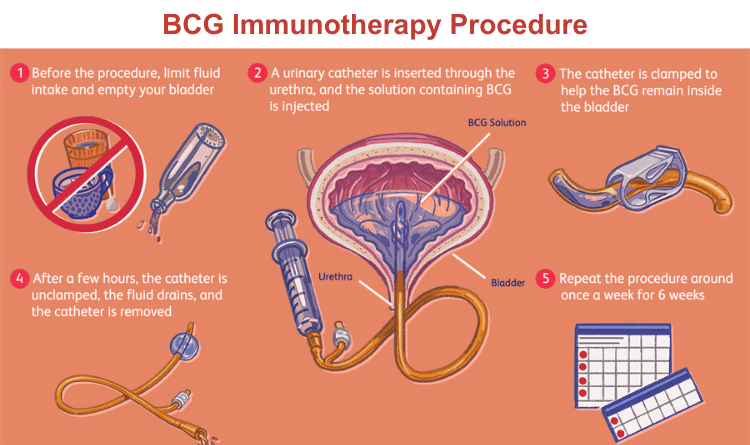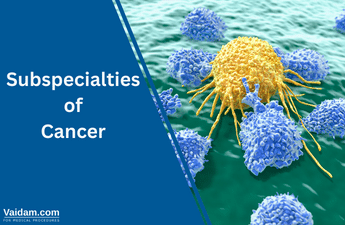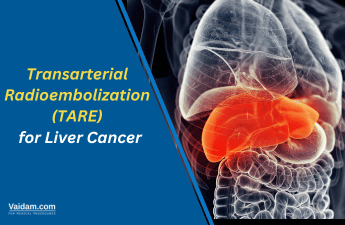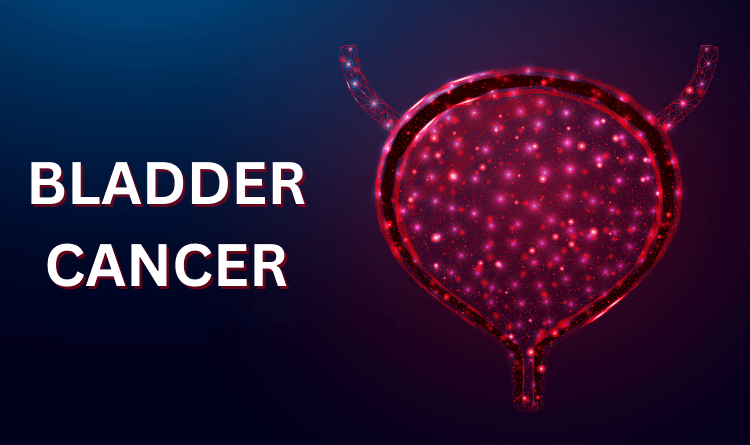
Cancer has become the most dreadful disease of the modern time. If we look at the statistics, around 10 million people lost their lives to the disease in 2020. Cancer can affect any part of the body, including the bladder. With over half a million people affected by the disease, bladder cancer was the 6 most commonly diagnosed cancer in 2020.
If you or any of your known ones have been diagnosed with bladder cancer, you must start the treatment immediately. And if you are confused about where to go for the treatment, let us help you. Various countries are providing the latest treatment modalities for cancer, and that too at an affordable price!
The oncology hospitals in India, Germany, Turkey, Thailand, and the United Arab Emirates observe thousands of patients yearly for bladder cancer treatment.
So go on! Read our blog further to better understand bladder cancer, its symptoms, and, most importantly, its treatment.
Get in Touch with Medical Experts
What is Bladder Cancer?
The bladder is a hollow organ which serves the function of storing urine. When the organ's cells start to divide unorganized, a cluster of cells is formed. This is known as bladder cancer.
Anyone can develop bladder cancer at any stage of life. However, your risks of getting the disease are higher if:
- You are a smoker
- You are aged 60 or above
- You have a family history of the disease
- You are suffering from chronic infections of the organ
What are the Types of Bladder Cancer?
The bladder consists of several different types of cells. Each cell type has the potential to become cancerous. Based on the kind of cell that transforms into cancer, bladder cancer is differentiated as:
- Urothelial Carcinoma: Urothelial cells perform the function of contraction and expansion to empty the bladder. When these cells start to divide uncontrollably, urothelial carcinoma occurs.
- Squamous Cell Carcinoma is a rare type/form of bladder cancer in which the squamous cells get converted into cancerous cells. It is associated with long-term use of catheters or chronic infections.
- Adenocarcinoma is another rare type of bladder cancer that starts from the glandular cells in the bladder. These are mucus-secreting cells present in the lining of the bladder.
Based on location, bladder cancer can be of two types.
- Non-Muscle Invasive Bladder Cancer: When the cancer has not spread to the bladder's walls.
- Muscle-Invasive Bladder Cancer: When the cancer has spread to the walls of the bladder and other organs.
What are the Signs of Bladder Cancer?
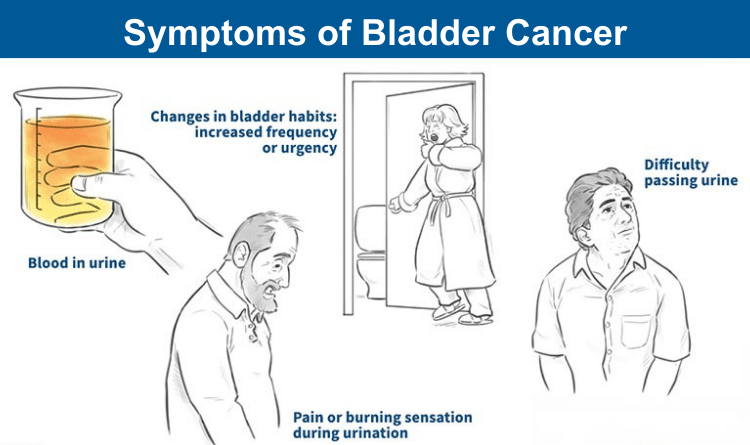
Some common symptoms associated with bladder cancer are:
- Blood in urine
- Pain while passing urine
- Burning sensation while urinating
- Increased frequency of urination
- Not able to urinate when you need to
- Back pain
- Pain in bone
- Feeling tired
- Swelling in feet
Please remember that it is not necessary that you have developed bladder cancer if you are experiencing any of these symptoms. It's always advisable to consult a specialist who can confirm the disease's diagnosis.
Where to Go After Bladder Cancer?
Urologic Oncologists are the medical specialists that diagnose and treat bladder cancer. Suppose you are experiencing any bladder cancer-related symptoms and want to get the diagnosis done or are already diagnosed with the cancer and want the right treatment. In that case, a Uro-oncologist is the one you should consult.
Selecting the best physician becomes vital for a successful treatment. Uro-oncologists in India, Germany, Turkey, Thailand, and UAE are highly skilled and experienced in treating bladder cancer of any stage. They use the latest treatment methods and a patient-centric approach to provide excellent medical care.
What are the Treatments Available for Bladder Cancer?
Your treating physician will decide the correct treatment approach based on your type and stage of bladder cancer. If you have any questions regarding the treatment plan, it is okay to ask questions to the treatment team.
Non-muscle-invasive bladder cancer is treated by TURBT surgery, chemotherapy, and/or immunotherapy. For muscle-invasive bladder cancer, the treatment plan includes surgery (cystectomy), chemotherapy, immunotherapy, radiation therapy, or trimodal therapy.
If you are unwilling to remove your complete bladder, trimodal therapy will be the most suitable treatment plan. It involves a shorter surgery (TURBT) followed by radiation and chemotherapy.
Let's explore these treatment methods in detail.
Chemotherapy
No one is unaware of the term chemotherapy. It is the first line of treatment for most cancers in which the patient receives cytotoxic drugs. For bladder cancer, you might receive chemotherapy in two ways.
- Intravesical Chemotherapy: Local or intravesical chemotherapy is given by the urologist. They will insert a catheter into the bladder through the urethra. The catheter then delivers the chemotherapeutic agents directly to the tumor. However, local chemotherapy only kills the superficial cancer cells, not those in the bladder wall or that have spread to other organs. Mitomycin-c, gemcitabine, docetaxel, and valrubicin are common therapeutic agents approved for intravesical chemotherapy.
- Systemic Chemotherapy: Intravenous or systemic chemotherapy delivers drugs directly into the bloodstream, where they travel to cancer cells present anywhere in the body. Carboplatin, cisplatin, fluorouracil (5-FU), doxorubicin, methotrexate, vinblastine, mitomycin, and gemcitabine are the common drugs used for systemic chemotherapy. These agents may be used alone or in combination for bladder cancer treatment.
Immunotherapy
What would be better than using your body's self-defense mechanism to fight cancer? Immunotherapy has appeared as a boom in cancer treatment that helps achieve this goal. The therapy stimulates the immune system to better identify and destroy cancer cells. Just like chemotherapy, it is also given in two ways.
- Intravesical Immunotherapy: Bacillus Calmette-Guerin (BCG) is a type of mycobacterium that is first weakened and then used as an immunotherapy drug. For intravesical therapy, the BCG drug is directly given to the bladder with the help of catheters. As the BCG gets attached to the lining of the bladder, the body's immune system gets activated and destroys the cancer cells. If the treatment with BCG does not work well on bladder cancer, it might be combined with Interferon, which is also a type of immunotherapy.
- Systemic Immunotherapy: For advanced stages of bladder cancer, systemic or intravenous immunotherapy becomes the most suitable choice of therapy. Drugs like avelumab, nivolumab, and pembrolizumab are available for treatment. These drugs are given intravenously to help the immune system identify and attack cancer cells.
Targeted Therapy
Chemotherapy has various side effects like nausea, vomiting, fatigue, hair loss, increased risk of infection, etc. These side effects result from damage done to the normal body cells by the chemotherapeutic agent. Targeted therapy resolves the problem of normal cells being affected by cytotoxic drugs.
- The therapy works by identifying specific genes and proteins present in the cancer cells.
- The drugs used in targeted therapy have the potential to block the action of proteins and enzymes that are accountable for the growth of cancer cells.
- Some of the common drugs for treating bladder cancer are ramucirumab, erdafitinib, enfortumab vedotin, and sacituzumab govitecan.
- But you must remember that not all tumors will have the same targets. Therefore, it becomes necessary that you get the genomic tests done to check for the specific genes and proteins in your tumor.
Radiation Therapy
You must have heard about X-rays, right? You might be surprised to know that these can also be used to treat cancer.
- Radiation therapy is one such treatment in which high-energy X-rays disrupt the cancer cells.
- Radiation oncologists give the therapy.
- When a machine present outside the body gives the radiation, it is known as external beam radiation therapy.
- An implant may be placed inside your body, emitting high radiation doses. This type of radiation therapy is called IRT or internal beam radiation therapy.
- Giving radiation therapy alone and as a primary treatment is not generally preferred. It is mostly given in combination with chemotherapy or after surgery to kill any remaining abnormal cells.
Surgery
Multiple types of surgeries are available to treat bladder cancer. Your surgeon will select the most suitable type based on your cancer stage, general health, and needs.
- TURBT: The transurethral resection of bladder tumors is a technique used for diagnosing the disease and treating non-muscle invasive bladder cancer. The surgery helps remove the tumor on the inner layers of the bladder, and has not metastasized. The surgeon uses an electric wire loop or high-energy laser to cut/burn the cancer.
- Cystectomy: There are chances that the surgeon might recommend removing a part or the complete bladder. This type of surgery is known as cystectomy and helps treat muscle-invasive bladder cancers. When the surgeon removes the prostate, seminal vesicles, bladder, and surrounding lymph nodes, it is known as a radical cystectomy.
If there's a complete removal of the bladder, it's obvious that you will need a new way to pass the urine. You will require a urine diversion surgery after a radical cystectomy. Common urine diversion surgeries are:
- Neobladder Reconstruction: In this type of urine diversion, the surgeon uses a part of the intestine to create a sphere-shaped reservoir (neobladder). The neobladder is placed inside the body and attached to the urethra. This allows most people to urinate normally.
- Continent Urinary Reservoir: This surgery is similar to neobladder reconstruction as it also uses part of the intestine to create a new reservoir to hold the urine. For draining the urine, an opening is made in the abdomen.
What is the Cost of Bladder Cancer Treatment?
As mentioned earlier, there are various ways to treat bladder cancer. The Uro-oncologist will decide the correct course of treatment after evaluating all the test reports. Once the treatment is decided, the patient will be provided an estimate of the cost.
In general, bladder cancer treatment cost in India revolves around INR 1,35,000 to 1,80,000. International patients can expect this cost to be USD 2,700 to 3,300.
Turkey and Thailand offer bladder cancer treatment in the price range of USD 5,400 to 6,500.
The cost of bladder cancer treatment in Germany is between USD 8,000 to 9,000. The slightly high prices are justified as the country offers the most advanced techniques and therapy for treating bladder cancer.
To Conclude
Getting diagnosed early is the key to a successful treatment of cancer. Bladder cancer can be fatal if not treated timely. Cancer management will depend on the type and the stage of the disease. A combination of radiation, chemo, and surgery is generally advised for treating bladder cancer. Oncologists also use newer techniques like immunotherapy and targeted therapy to get better outcomes.

